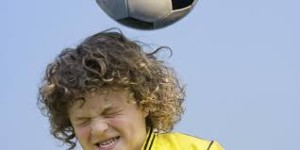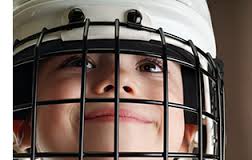Concussion in Child Athletes: Let The Sports Rehab Center Give You a ‘Heads’ Up!
By Katherine McWilliams, SPT and Christynne Papincak, PT, DPT
School has started and fall sports are in full swing. The occasional bump or bruise is expected in some sports such as football and soccer but there are certain injuries that should be treated with more than a band-aid and pat on the shoulder. One such injury is a concussion; here we provide you with some pertinent information on this often overlooked injury.
What is a concussion?
A concussion is medically defined by the American Medical Society for Sports Medicine as “a traumatically induced transient disturbance of brain function and occurs when linear and/or rotational forces are transmitted to the brain.” Okay, English please! A concussion is an injury to the brain that affects normal brain function. They are considered a mild traumatic brain injury (MTBI) on a scale of mild-severe. However, you should not let the word “mild” or the fact you cannot physically see the injury misguide you; concussions cause injury at the cellular level in the brain and take varying amounts of time to heal based on their severity.
What are the signs/symptoms I should look out for?
There should be a licensed professional (Athletic trainer, physician, EMT, physical therapist, etc.) present at your child’s sporting event that is trained to screen and handle the situation. If this is not the case or you are at a sporting event and witness a bump, blow, or hit to the head, you can screen for the following that call for urgent medical attention: **Some cases do not show symptoms until hours or days after the event!
– Loss of consciousness (no matter how short)
– Dazed/stunned demeanor
– Any other abnormal personality changes (irritable, sad, nervous)
– Confused about the event
– Difficulty sleeping
– Cannot remember events before OR after the event
– Forgets class schedule or assignments (not because they don’t want to do their homework!)
The following at any point indicate an immediate emergency department visit is necessary:
– Loss of consciousness
– Convulsions/seizures
– Repeated vomiting or nausea
– A worsening headache that does not subside
– Weakness, numbness, or decreased coordination
– Difficulty recognizing people or places
– Increasing confusion, restlessness, or agitation
– Slurred speech
 But this is the big game! Why is it important to identify concussions and allow adequate time for recovery?
But this is the big game! Why is it important to identify concussions and allow adequate time for recovery?
During the healing process, increased vulnerability exists; this includes increased risk for worsened cellular changes and more significant long-term cognitive changes. There exists a condition known as Second Impact Syndrome (SIS) that is described as occurring when a second hit to the head is experienced prior to full recovery of the initial injury. The effects of SIS include coma or death. If your child has ANY of the above symptoms after experiencing a hit to the head it is imperative that they do NOT return to play/activity and medical attention is received and taken seriously.
My child experienced a concussion; what should I expect during recovery how can I help them throughout?
Post-concussion symptoms vary greatly from case to case. Physically, your child may have headaches, excessive fatigue, and difficulty sleeping. Personality/cognitive changes might include depressive symptoms, difficulty concentrating, and decreased attention. Your child’s teachers should be notified and appropriate measures taken based on their individual circumstance. Time off, shortened school days, decreased workload, and increased time for completion of assignments/exams should all be considered. Time spent on the computer, playing video games, or watching television may cause symptoms to reappear or worsen and should therefore be avoided.
Your child may experience frustration, sadness, and anger which are all common reactions since they are missing time away from friends, sports, and hobbies they enjoy. Providing your child with support, encouragement and maintaining open communication will help them through this process as they are likely to get frustrated by missing time away from friends, sports, and hobbies they love.
How long does recovery take?
Majority of concussions heal in 7-10 days. However, this varies greatly on the level of damage and it is important to know that youth athletes have a prolonged recovery since their brains are still developing. In some cases, it may take several weeks to months to return to normal activities. Your child should ease into physical and cognitive activities slowly and doctor recommendations should always be followed.
Is there anything I can do to prevent this from happening again?
Unfortunately, helmets, mouth guards, and other protective equipment are not proven to prevent concussions at this time but are recommended in certain sports for prevention of other injuries. What you can do is ensure you and other parents encourage fair play and demonstrate positive role modeling; this has been proven to help prevent concussions and other sport injuries. It is also important to confirm rigorous education and consistent modeling regarding the children’s coaches and officials as well as adhering to strict rules and teaching proper form throughout games and practice.
References:
Cancelliere, C., et al. (2014). Systematic Review of Prognosis and Return to Play After Sport Concussion:
Results of the International Collaboration on Mild Traumatic Brain Injury Prognosis. Archives of Physical Medicine and Rehabilitation, 95, S210-S229.
Centers for Disease Control and Prevention. (May 2010). Know your concussion ABCs: A fact sheet for
parents [handout]. U.S. Department of Health and Human Services, Atlanta, GA.
Eisenberg, M., et al. (2014). Duration and Course of Post-Concussive Symptoms. Pediatrics, 133, 998-
1007. (2014, May 12). Retrieved August 27, 2014.
Guskiewicz, K., Mcleod, T. (2011). Pediatric Sports-related Concussion. PM&R, 3(4), 353-364.
Harmon, K., et al. (2012). American Medical Society for Sports Medicine position statement: Concussion
in sport. British Journal of Sports Medicine, 47, 15-26. (2012, October 30). Retrieved August 27, 2014.
Purcell, L. (2009). What Are The Most Appropriate Return-to-play Guidelines For Concussed Child
Athletes? British Journal of Sports Medicine, 43, I51-I55. Retrieved August 26, 2014, from bjsm.bmj.com